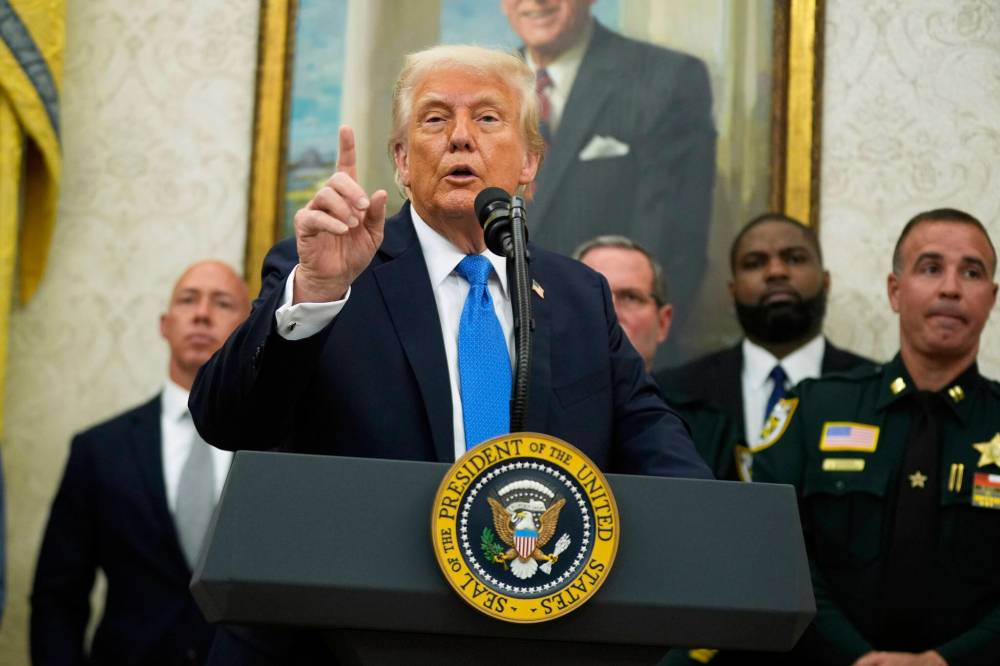No surprise: Trump couldn’t legally levy tariffs
Advertisement
Read this article for free:
or
Already have an account? Log in here »
To continue reading, please subscribe:
Monthly Digital Subscription
$0 for the first 4 weeks*
- Enjoy unlimited reading on winnipegfreepress.com
- Read the E-Edition, our digital replica newspaper
- Access News Break, our award-winning app
- Play interactive puzzles
*No charge for 4 weeks then price increases to the regular rate of $19.00 plus GST every four weeks. Offer available to new and qualified returning subscribers only. Cancel any time.
Monthly Digital Subscription
$4.75/week*
- Enjoy unlimited reading on winnipegfreepress.com
- Read the E-Edition, our digital replica newspaper
- Access News Break, our award-winning app
- Play interactive puzzles
*Billed as $19 plus GST every four weeks. Cancel any time.
To continue reading, please subscribe:
Add Free Press access to your Brandon Sun subscription for only an additional
$1 for the first 4 weeks*
*Your next subscription payment will increase by $1.00 and you will be charged $16.99 plus GST for four weeks. After four weeks, your payment will increase to $23.99 plus GST every four weeks.
Read unlimited articles for free today:
or
Already have an account? Log in here »
It’s a big win, but in the end, do wins even matter?
A decision by the U.S. Court of International Trade confirmed Wednesday what everybody already knew: that U.S. President Donald Trump can’t use trumped-up emergency powers to address magically created emergencies and then implement trade tariffs at his whim.
The panel of three judges unanimously ruled that Trump does not have the authority to impose a wide range of global tariffs using the International Economic Emergency Powers Act of 1977.

manuel balce ceneta / The Associated Press files
U.S. President Donald Trump
The act is usually referred to by the acronym IEEPA. It’s a law that lets the U.S. president step in and control economic transactions to address a national emergency. That move overrides the U.S. Congress, which has the exclusive power to “lay and collect taxes, duties, imposts and excises” and to “regulate commerce with foreign nations” under the U.S. constitution.
The judges were scathing in their decision, writing that, “any interpretation of IEEPA that delegates unlimited tariff authority is unconstitutional.”
“The president’s assertion of tariff-making authority in the instant case, unbounded as it is by any limitation in duration or scope, exceeds any tariff authority delegated to the president under IEEPA. The worldwide and retaliatory tariffs are thus ultra vires and contrary to law,” the decision said.
It continued, “the challenged tariff orders will be vacated and their operation permanently enjoined,” halting the imposition of the duties countrywide, and ordering both “Liberation Day” global tariffs and the fentanyl-related duties against Canada and Mexico must be removed within 10 days. Some other tariffs, such as steel and aluminum tariffs levied against Canada and others, remain in place because they weren’t put in place using IEEPA.
The Trump administration immediately appealed the court’s decision, and the court hearing the appeal has temporarily halted the removal of the tariffs. The case will probably eventually reach the U.S. Supreme Court, where the judges will have a distinct problem: Republican-appointed Supreme Court judges have long maintained that a literal interpretation of the U.S. constitution is the proper way to address constitutional questions, and that is exactly what the Court of International Trade panel of judges has delivered.
Will the judges on the Supreme Court follow the principles they claim are paramount, or will they put principles on the shelf to pander to politics?
Time will tell.
As soon as the decision came down, you could imagine administration spokespeople such as Trump deputy chief of staff Stephen Miller announcing that the decision was made by a Marxist, power-seeking, appointed judiciary — because that’s been the pat response to a steady march of court decisions striking down arbitrary actions by the White House.
In the hours afterwards, White House spokesman Kush Desai said “it is not for unelected judges to decide how to properly address a national emergency … President Trump pledged to put America First, and the administration is committed to using every lever of executive power to address this crisis and restore American greatness.”
(Miller did not disappoint, either, shortly afterwards announcing on social media that, “The judicial coup is out of control.”)
The problem is there is no emergency and there never was. There was only ever an excuse.
What remains to be seen is whether Trump and his crew of magical thinkers will even listen to the law — or just continue to claim that Trump has absolute powers that override even the constitution of the United States.
Time will tell: if, in 10 days, the tariffs remain in place, it will be absolutely clear that Trump’s administration believes itself to be above the law. And that would be one more step down the road to U.S. autocracy.


